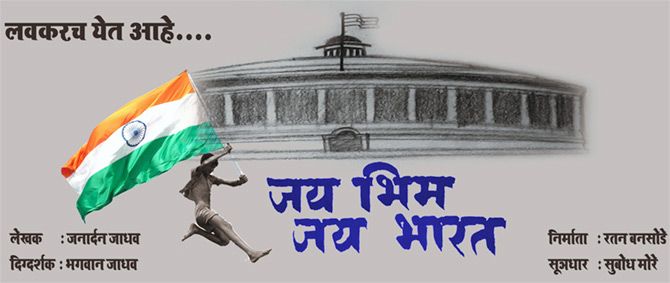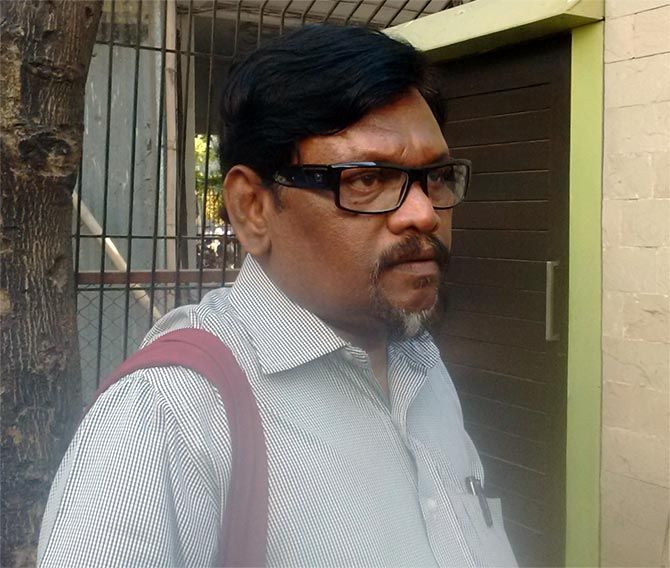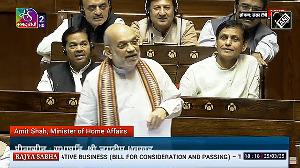
'Muslims and Dalits must erase the way they remember their past, or carry out their performances in private,' says Jyoti Punwani, as Maharashtra's Censor Board denies permission to a play Jai Bhim, Jai Bharat.
The past is never dead. It is not even past.
-William Faulkner
No one knows this more than the RSS and its affiliates. The BJP revived itself from annihilation after 1984 by invoking a past everyone but they had forgotten about. The Babri Masjid in Ayodhya was an unknown monument; Ayodhya was a temple town associated with Ram.
It took seven years of intense planning for the RSS to make the centuries-old Babri Masjid a symbol of Muslim domination over Hindus which had to be brought down, and to reduce the much loved god Ram to one spot in Ayodhya.
Aurangzeb Road in Delhi had been there since Independence, just another road recalling the city's royal history. It took a BJP government to replace its name, invoking the misdeeds of an emperor who had ruled almost 400 years ago.
So why can't others invoke the past too?
In Mumbai, a Censor Board for theatre, appointed by Maharashtra's BJP-Shiv Sena government, has just ordered Dalit playwright Janardhan Jadhav to change the names of places where attacks have taken place against Dalits, lest the mention of these during the play's performance revives unpleasant memories among viewers.
Jadhav's latest play, Jai Bhim Jai Bharat, submitted to the Censor Board in November, has been denied permission to be staged until 10 cuts are carried out. A hall has been booked for Sunday, February 7, but it is not sure whether the play will be performed with or without the cuts.
The 10 cuts include deleting the name Khairlanji (the Maharashtra village where three members of the Dalit Bhootmange family were mutilated and killed in 2006), and Ramabai Nagar (the Mumbai colony where 10 Dalits were shot dead by the police while protesting the desecration of Dr Ambedkar's statue in 1997).
These must be replaced by Wairlanji and Mira Bai Nagar respectively. So must the names of Ramabai Nagar's victims and Manohar Kadam, the policeman who was convicted by a sessions court for the firing.
"Who knows, someone in the audience may be so disturbed when the Ramabai Nagar incident is brought up, that he may throw a stone," explains Censor Board member Ashok Samel. "It doesn't take long for one stone to change into a hundred. Will Jadhav give a deposit of Rs 1 crore (Rs 10 million) in case the theatre is destroyed, leave aside the lives that may be lost?"
So should Ramabai Nagar and Khairlanji never be written about?
"The Ramabai Nagar firing was the murder of humanity. I witnessed it myself. Now Janardhan Jadhav wants to murder humanity again. Intellectuals must not be negative, they should spread positivity," says Samel.
Back in 1985, the RSS knew when it started the campaign to demolish the Babri Masjid, that people would be provoked to more than just throwing stones. In fact, L K Advani's rath yatra started with him being anointed with a tilak in blood at the Somnath Temple in Gujarat.
Speeches recalling the 'invader Babar', references to 'Babar ki aulad', slogans about 'bheeshan sangharsh (fearsome struggle)' and 'talwar nikli myan se (the sword has been unsheathed)', made during the yatra, were so provocative that the yatra left 564 dead in 116 places (Source: People's Union for Democratic Rights report), some of which had never seen rioting.
So, uncaring for the consequences, Hindutvawadis, led by their senior-most leaders, can hit the streets at will, and recount their version of the distant past with violent imagery. It is worth noting that neither the RSS nor the BJP, nor Advani, has ever said the rath yatra was wrong. Indeed, it occupies pride of place in Advani's autobiography, as well as on the BJP Web site.
But Dalits must not even mention the names of places where they were killed in recent times in public performances? How do they recount their stories of oppression, then? Should they just forget them, or keep quiet if they are not able to forget? Let bygones be bygones?
This phrase was heard repeatedly when the Justice B N Srikrishna Commission of Inquiry submitted its report on Mumbai's 1992-93 riots to the Maharashtra government in 1998. The riots had broken out soon after the Babri Masjid was demolished. The Shiv Sena, its chief Bal Thackeray, and Advani's rath yatra were among those blamed by Justice Srikrishna.
Loath to table the report, let alone act on it, the Shiv Sena, which was then in power in the state, kept saying it was best to let bygones be bygones, instead of raking up old wounds. Even the Bombay high court used this argument while exonerating Bal Thackeray as editor of Saamna from the charge of promoting communal enmity through his writings in the newspaper through the riots.
But the logic of 'let bygones be bygones' was not applied by the same state Censor Board (albeit with different members), back in 1997, when it passed without any cuts, Pradeep Dalvi's Mee Nathruram Godse Boltoy (I am Nathuram Godse Speaking).
The play, written about 40 years after Gandhi's assassination, had its main character Nathuram Godse, the assassin, justifying his act, invoking old resentments against Gandhi. The Board stuck to its stand even after the Maharashtra government asked it to review the play in 1998, when the Mumbai police did not give permission to stage the play, anticipating law and order problems.
The Bombay high court later struck down the government notification ordering the forfeiture of all copies of the play's script.
The possibility of tension being created because of the main character's critical references to Muslims didn't worry the Censor Board then.
 But the potential of creating casteist tension by reopening old wounds is not the only reason being given to impose cuts on Janardhan Jadhav's play. The play shows a resurrected Dr Ambedkar talking to a resurrected Gandhi. Some of Dr Ambedkar's dialogues have been asked to be cut, including those which refer to 'Hindutvawadis.'
But the potential of creating casteist tension by reopening old wounds is not the only reason being given to impose cuts on Janardhan Jadhav's play. The play shows a resurrected Dr Ambedkar talking to a resurrected Gandhi. Some of Dr Ambedkar's dialogues have been asked to be cut, including those which refer to 'Hindutvawadis.'
IMAGE: Playwright Janardhan Jadhav. Photograph: Jyoti Punwani
Explaining his objections, Samel said Dr Ambedkar would never have used abusive terms towards Hindus or Hinduism. This was a distortion of Dr Ambedkar's character. He should know, he said; he had made a documentary on Dr Ambedkar in collaboration with Dalit writer Baburao Bagul.
The question arises: Doesn't the playwright have the poetic licence to make his characters, even if they are based on real-life icons, say whatever he wants?
Interestingly, Mee Nathuram Godse Boltoy was critiqued by the well-known scholar Y D Phadke, who pointed out that Gandhi had been distorted by the playwright.
The entire Ayodhya movement, incidentally, distorted Ram's persona from a Maryada Purshottam, a model of good conduct, and a gentle god, to an aggressive warrior god. It could be argued that Ram would never have abused other communities and destroyed another's place of worship.
Then as now, the kind of Hinduism being projected by the RSS distorts the way Hindu religion has been practised. But real life theatre can only be censored by the State and society; and for much of the last 30 years, the State has been controlled by those who distort.
If Dalit memory is being told to tone down now, the recalling of bloody events wherein Muslims have been primary victims have also often been blocked by Censor Boards.
In 2014, the Film Censor Board denied documentary maker Shubhradeep Chakravorty a certificate for his documentary En Dino Muzaffarnagar, on the 2013 Muzaffarnagar riots. The documentary could provoke communal disturbances, said the Board.
Asked by the Delhi high court to justify its opinion, the Board revised it. Yet, it still hasn't issued a censor certificate to the film, despite the film's co-director carrying out the three cuts demanded by the Board.
Sometimes, such films have been okayed by the censors, only to be blocked by the police or Hindutva mobs. Last year, a screening of Nakul Singh Sawhney's film Muzaffarnagar Baaki Hai was disrupted by the BJP's student wing, the ABVP, in Delhi's Kirori Mal College, on the pretext that it hurt Hindu and Jat feelings and was one-sided. Soon after, the police stopped its screening in Shantiniketan, saying they apprehended trouble.
The 2007 movie Parzania was never allowed to be screened in Gujarat. The recollection of the 2002 violence against Muslims could not be tolerated by those who has perpetrated it. Babu Bajrangi, who boasted on camera about the way he had dismembered Congressman Ehsan Jafri (he has since been convicted), made sure such a negative portrayal could never be shown in the state.
So who gets to remember old wounds?
Again, it seems, the majority is free to recall history the way it wants -- Shivaji is, after all, portrayed, even in Maharashtra's text-books, as an anti-Muslim Hindu monarch by the Shiv Sena, and any other version of him is banned.
Muslims and Dalits, meanwhile, must erase the way they remember their past, or carry out their performances in private.











 © 2025
© 2025